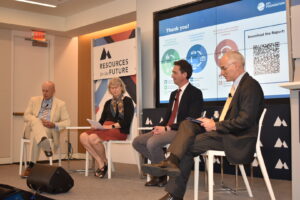Last month, the Energy Futures Initiative (EFI) released a report assessing the policy and market needs to responsibly deploy BECCS as a carbon removal opportunity. Former Energy Secretary Ernest J. Moniz introduced the paper on behalf of his EFI team at a release event at Resources for the Future. Sens. Heinrich (D-NM) and Cassidy (R-LA).
—
Report link: Taking Root: A Policy Blueprint for Responsible BECCS Development in the United States – Summary Report (June 2023)
—
EFI’s report on recommendations for bioenergy with carbon capture and storage (BECCS) outlines a robust federal policy blueprint to accelerate responsible BECCS deployment. BECCS has a large role to provide net negative carbon dioxide emissions, and must be scaled quickly in combination with strong greenhouse gas mitigation actions in order to reach net zero by mid century. However, BECCS technology has complex interactions with the climate, land, and energy which require thoughtful development to reach scale and provide full benefits.
The EFI report focuses on three themes:
- Accelerating BECCS commercialization and deployment
- Maximizing the social, economic, and environmental benefits of BECCS
- Responsible BECCS development, including consideration for environmental justice
On June 27, Resources for the Future hosted an event to mark the release of the report and facilitate a nuanced discussion of the benefits of BECCS and the necessary guidelines for BECCS to reach scale quickly and responsibly. Green Strategies’ President Roger Ballentine joined a panel with Virginia Dale, Professor of Ecology at the University of Tennessee and Sasha Mackler, Executive Director of the Bipartisan Policy Center’s Energy Program to discuss the roles of forest ecology, finance, policy, and ecosystem health on BECCS deployment.

Photo by the EFI Foundation (Kaycee Hubbard & Alicia Moulton)





